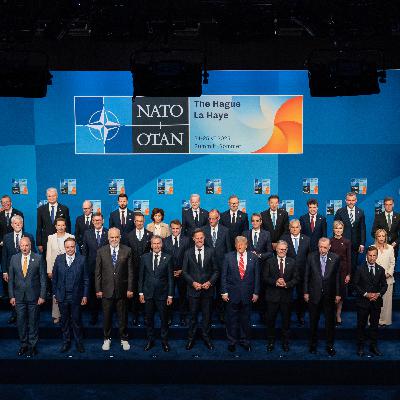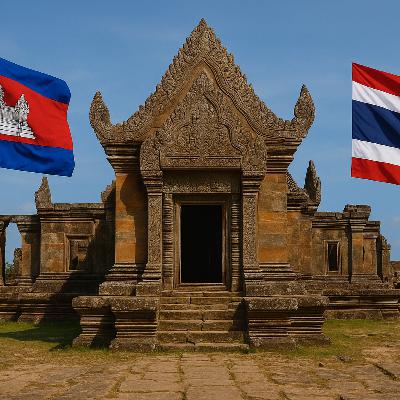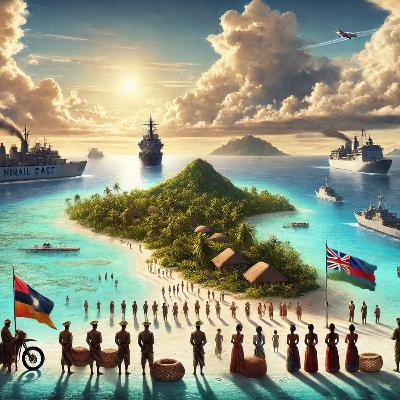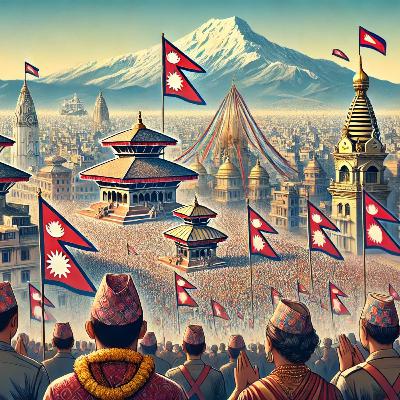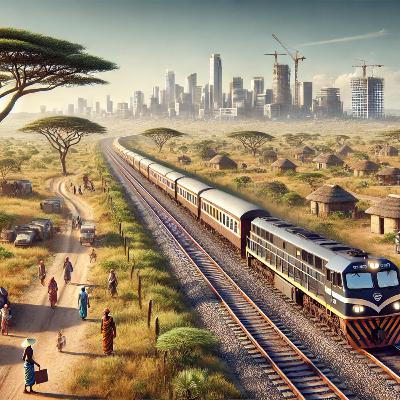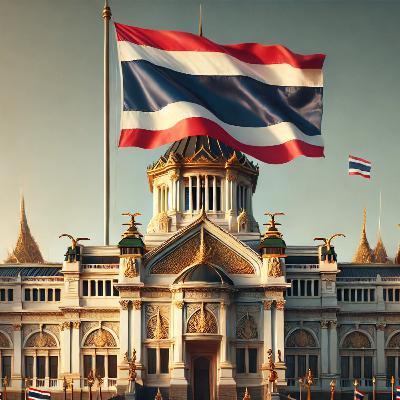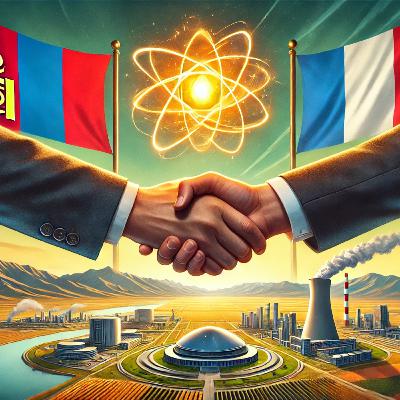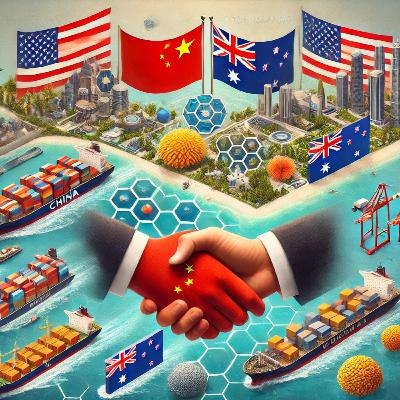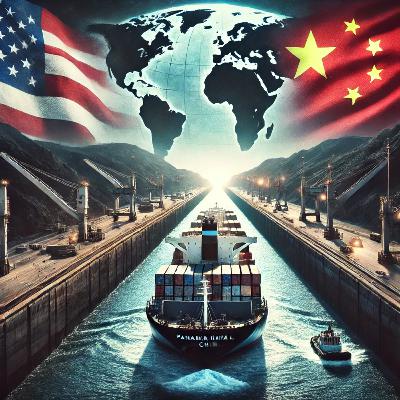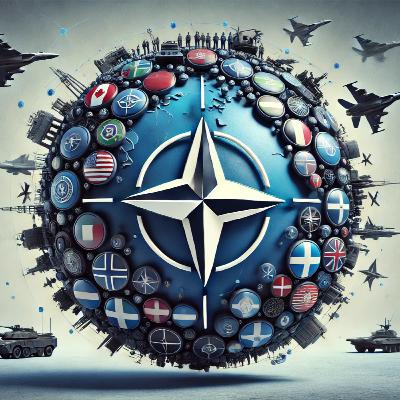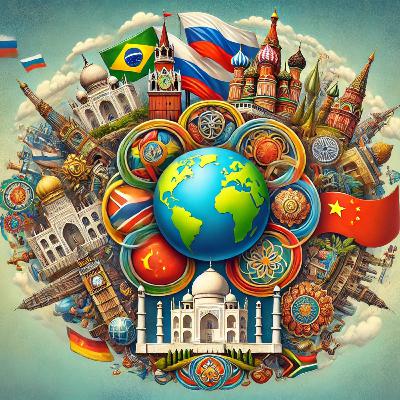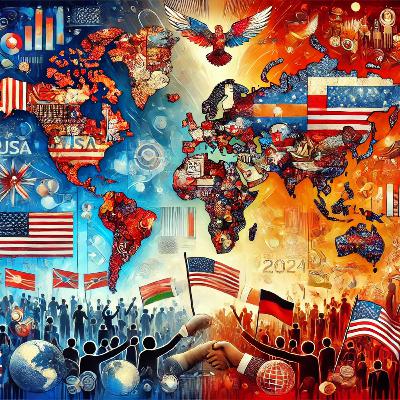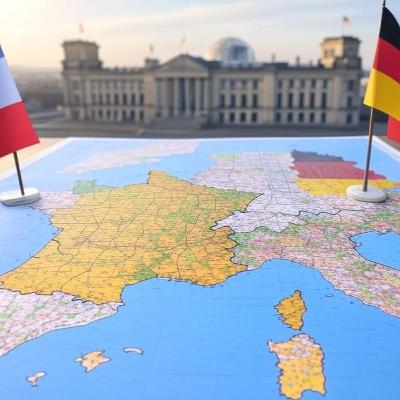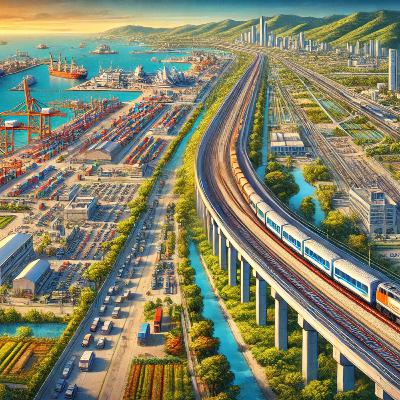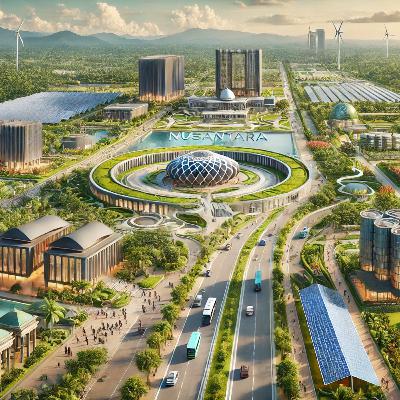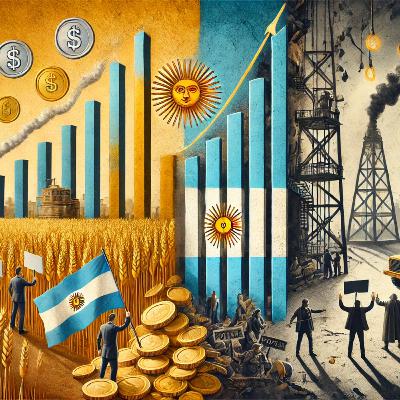Discover Global Politics
Global Politics

Global Politics
Author: GP Team
Subscribed: 4Played: 3Subscribe
Share
© GP Team
Description
🎙️ Your Guide to Global Politics 🌍🧭
Curious about the forces shaping our world? This podcast breaks down global political updates in a clear and informative way—no jargon, no noise, just thoughtful discussions that keep you updated. 🗞️📢
If you enjoy insightful analysis and nuanced perspectives on international affairs, hit the 'Follow' button and stay informed with every episode! 🎧✅
Curious about the forces shaping our world? This podcast breaks down global political updates in a clear and informative way—no jargon, no noise, just thoughtful discussions that keep you updated. 🗞️📢
If you enjoy insightful analysis and nuanced perspectives on international affairs, hit the 'Follow' button and stay informed with every episode! 🎧✅
17 Episodes
Reverse
China’s plan to build the largest embassy in Europe—right in the heart of London—has ignited a storm of debate. Officially, it’s about serving a growing diaspora and expanding cultural exchange. But behind the blueprints lie questions of espionage, influence, and national security. For the UK, the decision is more than planning permission—it’s a test of sovereignty in an age of great power rivalry.We break down:🏛️ The role of embassies in diplomacy—and the limits of host country control📜 What the Vienna Convention does (and doesn’t) allow once an embassy is built🇨🇳 China’s official explanation: students, visas, and cultural outreach🔍 The suspicions: surveillance, monitoring dissidents, and political influence campaigns🇬🇧 Why Britain is delaying approval—and the risks of saying yes or no🌍 How other countries are responding to oversized Chinese embassies🇮🇳 Why this controversy matters for India and the multipolar world orderThis isn’t just a construction project. It’s a window into how architecture becomes geopolitics—and how democracies grapple with the rise of an assertive China.⚠️ Disclaimer: This episode was generated using AI tools. Content, script, and voice may contain inaccuracies and are intended for informational purposes only.
A bold new pledge to spend 5% of GDP on defence has shaken the foundations of NATO—and raised urgent questions about the alliance’s future. Held in The Hague, the 2025 NATO Summit was supposed to be a show of unity. Instead, it revealed deep divisions, uneasy diplomacy, and a race to rearm in an increasingly unstable world.We break down:💰 The origins and politics of the 5% defence spending target🇪🇸 Why Spain pushed back—and how Trump responded🛡️ The reaffirmation of Article 5 and what it really means today📉 Fears about U.S. reliability and Europe's search for alternatives🛰️ NATO’s pivot to cyber, hybrid warfare, and industrial readiness🌍 What this summit tells us about the shifting balance of global powerThis isn’t just a defence summit. It’s a stress test for the world’s most powerful military alliance—and a preview of the conflicts and alliances that may define the coming decade.⚠️ Disclaimer: This episode was generated using AI tools. Content, script, and voice may contain inaccuracies and are for informative purposes only.(Image by Ministerie van Buitenlandse Zaken - CC BY-SA 4.0)
A thousand-year-old Hindu temple has once again become the flashpoint between two Buddhist nations in Southeast Asia. In this episode, we explore the complex and often volatile dispute between Thailand and Cambodia over the Preah Vihear Temple—an ancient site perched dramatically on a disputed border.We break down:🗺️ The colonial roots of the territorial disagreement⚖️ How international courts have ruled—and what they left unresolved🔥 The 2025 border skirmish and what triggered the latest diplomatic fallout🇰🇭🇹🇭 Why the temple matters so deeply to both Cambodian and Thai national identities🌐 The broader regional and geopolitical implications for ASEANThis is more than a land dispute. It’s a story of memory, nationalism, and the unfinished legacy of empire.⚠️ Disclaimer:This episode was generated using AI tools. Content, script, and voice may contain inaccuracies and are for informative purposes only.
In this episode, we unpack the historic 2025 agreement between the United Kingdom and Mauritius over the sovereignty of the Chagos Archipelago. While hailed by some as a long-overdue act of decolonization, others see it as a strategic compromise that leaves the displaced Chagossians behind.We explore:🔹 The colonial history and forced eviction of Chagossians🔹 The ICJ’s 2019 ruling and UN pressure🔹 Diego Garcia’s enduring military significance🔹 Reactions from the UK, Mauritius, and global powers🔹 What lies ahead for regional geopolitics and human rightsWhether you see this as a diplomatic victory or an unfinished story of injustice, this episode offers a clear, factual breakdown of one of the most symbolic territorial settlements in recent times.📌 Don’t forget to follow the show and leave a comment with your thoughts!⚠️ Disclaimer: This podcast — including its script, narration, and accompanying materials — was generated by AI tools. While it aims to provide informative and fact-based content, it may contain inaccuracies or simplifications. Listeners should treat all information as general background and not as expert advice or official reporting.
More than a decade after abolishing its monarchy, Nepal is experiencing a surprising resurgence of royalist sentiment. As political instability, economic hardship, and concerns about cultural identity fuel public dissatisfaction, thousands of Nepalese are rallying to restore the Hindu monarchy. But what's driving this movement, and how realistic is a return to monarchy in today's Nepal?In this episode, we explore:🔹 The historical roots of Nepal's monarchy—from national unification under the Shah dynasty to the dramatic 2001 Royal Massacre.🔹 Why Nepal’s shift to a federal republic in 2008 hasn't delivered the stability many expected.🔹 The key players leading the monarchy revival, including former King Gyanendra and the Rastriya Prajatantra Party (RPP).🔹 The factors fueling monarchist sentiment: political instability, economic struggles, cultural identity, and geopolitical pressures.🔹 Government and public responses—are Nepalis ready to abandon democracy, or do they seek a balance with constitutional monarchy?🔹 Future scenarios—could a referendum bring back the king, or will the republic endure despite growing tensions?Join us as we unpack the complexities of Nepal's monarchy movement, the tug-of-war between tradition and modernity, and what this could mean for the nation's future.🎧 Tune in now to gain a deeper understanding of Nepal’s monarchy revival!🔔 Follow our podcast for more in-depth analyses of global political trends and events!🚨 Disclaimer: This podcast, including its content and voiceover, was generated via AI and may contain inaccuracies. It is intended for informational purposes only and should not be taken as expert advice.Nepal monarchy, Hindu kingdom, King Gyanendra, Rastriya Prajatantra Party, Nepal politics, Jana Andolan, Nepal republic, political instability, Hindu identity, Nepal protests, royal revival, constitutional monarchy, democracy vs monarchy, geopolitical influence, South Asia politics, economic hardship, Nepali nationalism
Africa is experiencing a railway revolution, with billions of dollars pouring in from foreign powers. But is this investment fueling prosperity or creating new forms of dependency? China’s Belt and Road Initiative (BRI) has dominated railway construction across Africa, but the United States and its allies are pushing back with alternative projects like the Lobito Corridor. As global superpowers compete for influence, African nations are caught between economic opportunities and concerns over debt sustainability.In this episode, we break down:🔹 How China’s railway investments in Kenya, Ethiopia, and Nigeria are reshaping Africa🔹 The U.S.-backed railway projects, including the Lobito Atlantic Railway and European-funded alternatives🔹 The economic impact on African communities—who benefits and who loses?🔹 The growing debate over Chinese debt-trap diplomacy—myth or reality?🔹 How railway expansion ties into Africa’s geopolitical future and global resource battlesWith critical minerals like copper and cobalt at stake, and Africa’s infrastructure needs at an all-time high, railways have become a new battleground for global influence. Is this a new era of African economic transformation, or a high-stakes geopolitical power struggle?🎧 Tune in now for an in-depth look at the forces shaping Africa’s railway future!🔔 Follow our podcast for more insights into global economic and political trends! 🎙️🚨 Disclaimer: This podcast, including its content and voiceover, was generated via AI and may contain inaccuracies. It is intended for informational purposes only and should not be taken as expert advice.African railways, foreign investment, China in Africa, US vs China, debt trap diplomacy, Belt and Road Initiative, Lobito Corridor, Kenya railway, Ethiopia railway, Nigeria railway, Tanzania railway, infrastructure development, trade corridors, economic growth, geopolitics, railway expansion, global influence
Thailand is once again at a political crossroads. The opposition People’s Party has launched a no-confidence motion against Prime Minister Paetongtarn Shinawatra, accusing her of economic mismanagement, nepotism, and governance failures. As Thailand’s deep political divides resurface, the nation faces critical questions about its democratic future.In this episode, we break down:🔹 The key allegations behind the no-confidence motion🔹 How Thailand’s political dynasties and military influence shape governance🔹 The opposition’s strategy after the dissolution of the Move Forward Party🔹 Potential outcomes—will Paetongtarn survive, or is Thailand heading for another political crisis?🔹 The bigger picture: What this means for Thailand’s fragile democracyWill this no-confidence motion shake Thailand’s power structure or reinforce the status quo? Tune in for an in-depth analysis of the battle for Thailand’s political future!🔔 Follow our podcast for more insights into global political power plays! 🎧🚨 Disclaimer: This podcast, including its content and voiceover, was generated via AI and may contain inaccuracies. It is intended for informational purposes only and should not be taken as expert advice.Thailand politics, No-confidence vote, Paetongtarn Shinawatra, Thaksin Shinawatra, Thai government, Thai opposition, People's Party Thailand, Move Forward Party, Pheu Thai Party, Thai democracy, Political instability, Thailand coup history, Thai military influence, Constitutional monarchy, Southeast Asian politics#Thailand, #ThaiPolitics, #NoConfidenceVote, #PaetongtarnShinawatra, #ThaksinShinawatra, #PheuThaiParty, #MoveForwardParty, #ThaiOpposition, #PoliticalCrisis, #ThaiDemocracy, #ThailandElection, #MilitaryInfluence, #SoutheastAsia, #GlobalPolitics, #PodcastEpisode
Mongolia has just made a game-changing move—a $1.6 billion uranium agreement with France that could redefine its geopolitical standing. Nestled between China and Russia, Mongolia has long been in their economic shadow. But now, with this landmark deal, Ulaanbaatar is carving out a new path toward economic diversification and global energy influence.In this episode, we explore:🔹 What’s in the Mongolia-France uranium deal and why it matters🔹 How this agreement challenges China’s dominance over Mongolia’s economy🔹 Why France is betting big on Mongolian uranium for its nuclear energy future🔹 The geopolitical ripple effects—will China and Russia push back?🔹 The risks: environmental concerns, regulatory hurdles, and market volatilityCould this deal be Mongolia’s ticket to greater independence, or will it create new diplomatic tensions in the region? Will France’s move strengthen its position as a global nuclear powerhouse?📢 Tune in now for an in-depth analysis of this strategic partnership shaping global energy and geopolitics!🔔 Follow our podcast for more deep dives into international affairs and power shifts! 🎧🚨 Disclaimer: This podcast, including its content and voiceover, was generated via AI and may contain inaccuracies. It is intended for informational purposes only and should not be taken as expert advice.
The Pacific is heating up—not in climate, but in geopolitics. China’s latest deal with the Cook Islands is more than just economic cooperation; it’s a strategic move that has sent shockwaves through New Zealand, Australia, and the United States. While Beijing secures new ground through infrastructure development and seabed mining, Western allies are left scrambling to respond.In this episode, we unpack:🔹 Why the Cook Islands, a tiny nation, holds massive geopolitical value🔹 China’s growing influence in the Pacific and its long-term game plan🔹 Why New Zealand and Australia are worried about losing regional control🔹 The U.S. perspective—another front in the Indo-Pacific rivalry?🔹 What this means for global trade, rare earth minerals, and power shifts in the regionIs this another step in China’s Belt and Road Initiative, or is it part of a larger plan to reshape Pacific politics? Could this seemingly small deal trigger bigger global consequences?📢 Tune in now for an in-depth analysis of this power struggle shaping the future of the Pacific!🔔 Follow our podcast for more deep dives into global affairs and emerging power shifts! 🎧⚠️Disclaimer: This podcast episode was created using AI tools, including thescript, narration, and research. While we strive for accuracy, the content may containinaccuracies and is forinformational purposes only.
🎙️ Podcast Episode: The Panama Canal – A New Battleground in U.S.-China Rivalry 🚢ThePanama Canal has long been akey player in global trade, but today, it’s at the center of rising tensions between theUnited States and China. As China expands its influence inLatin America through theBelt and Road Initiative (BRI) and the U.S. pushes back, the canal is becoming astrategic flashpoint in their global rivalry.In this episode, we explore:🔹Why the Panama Canal is crucial for global trade🔹China’s growing investments and control over key ports in Panama🔹U.S. concerns about China’s influence near this critical waterway🔹The potential consequences for international politics and global supply chainsWith both superpowers vying for influence, could the canal’sneutrality be at risk? And what does this mean for the future of global commerce and security?📢Tune in now for a deep dive into the history, geopolitics, and future implications of this unfolding power struggle!⚠️Disclaimer: This podcast episode was created usingAI tools, including thescript, narration, and research. While we strive for accuracy, the content may containinaccuracies and is forinformational purposes only.🔔Follow our podcast for more global affairs analysis! 🎧🎥Want to learn more? Watch this video on the topic:https://youtu.be/C4oIEJKlE90
In this episode, we explore the North Atlantic Treaty Organization (NATO)—the world’s most powerful military alliance—and its impact on global security. We also break down the Major Non-NATO Ally (MNNA) status, a special designation granted by the U.S. to select nations for military cooperation.
🔍 Topics Covered:
✅ The origins and purpose of NATO✅ The strategic benefits of NATO membership✅ What is MNNA status, and how does it differ from NATO?✅ A look at countries with MNNA status and why they have it✅ The debate: Should the U.S. reconsider some MNNA designations?
Join us as we analyze how alliances shape global security, diplomacy, and military strategy. Are these partnerships based on mutual interests, or are they purely strategic moves by powerful nations? Tune in to find out!
🎧 Subscribe & Listen: Available on Spotify, Apple Podcasts, Google Podcasts, and all major platforms.
#NATO #MNNA #GlobalSecurity #Geopolitics #ForeignPolicy #MilitaryAlliances #InternationalRelations #DefenseStrategy #Podcast
Disclaimer: This podcast episode, including its audio, thumbnail and all other content was generated using AI tools. While every effort has been made to ensure accuracy, some details may not fully reflect the latest developments.
In this episode, we delve into Indonesia's historic entry into BRICS, the influential alliance of emerging economies—Brazil, Russia, India, China, and South Africa. Now expanded to BRICS+, this bloc has gained fresh momentum with Indonesia as its latest member, joining the ranks of Egypt, UAE, Iran, and others in reshaping global governance.
Explore the origins of BRICS, its evolution into a geopolitical powerhouse, and the strategic importance of Indonesia’s inclusion. How does this shift enhance BRICS' economic and geopolitical clout? What opportunities and challenges lie ahead for Indonesia as it balances its ASEAN leadership, Indo-Pacific strategy, and ties with Western powers?
We unpack the transformative impact of this expansion on the global economic order, shedding light on the aspirations of the Global South in crafting a multipolar world.
Join us for insights, analysis, and perspectives on the changing dynamics of international relations and what Indonesia’s membership means for the future of BRICS+.
Disclaimer: This podcast episode, including its audio, was generated using AI tools. While every effort has been made to ensure accuracy, some details may not fully reflect the latest developments.
Podcast Blurb:
2024: A Year of Political Earthquakes 🌍
Step into a world reeling from seismic shifts in politics and society. In this episode, we dissect the pivotal events that shaped 2024—from the global anti-incumbent wave that toppled governments across continents to the exceptions that defied the trend. Explore the dramatic elections in South Africa, Japan, and the UK, the resurgence of Donald Trump in the US, and Claudia Sheinbaum’s historic win in Mexico.
Dive into the intensifying geopolitical tensions in the Middle East and Eastern Europe, the coups that redrew power dynamics in Syria and Bangladesh, and the rising threats faced by minority Hindu communities. Through stories of resilience and disruption, we uncover the broader implications for the global order and the lessons to carry into 2025.
Tune in for a captivating journey through the political tapestry of a year that will not soon be forgotten.
(All the content, audio and images are generated via GenAI tools)
In this episode, we dive into the political crises shaking the foundations of Europe’s biggest democracies. France witnesses its first no-confidence vote in decades, toppling a government over austerity measures, while Germany faces a coalition collapse, triggering early elections. What do these upheavals mean for the European Union's stability, transatlantic relations under Trump 2.0, and the future of democratic governance in times of economic strain? Join us as we unravel the implications of these historic events.
(The content and audio was generated via AI, and some of the information might be inaccurate)
In this episode, we uncover the fascinating story of Mexico’s bold new infrastructure project: the Interoceanic Corridor of the Isthmus of Tehuantepec. Spanning coast to coast, this transformative railway is poised to reshape global trade, offering an alternative to the Panama Canal while unlocking economic potential in southern Mexico.
We’ll explore how this 303-kilometer railway connects the Gulf of Mexico to the Pacific Ocean, the cutting-edge industrial parks sprouting along its route, and the opportunities it promises for manufacturing and trade. But it’s not all smooth tracks — the corridor faces environmental and social hurdles, from indigenous land rights to biodiversity concerns.
(All content and audio was generated through AI tools)
Indonesia is building a new capital city from scratch. It's called Nusantara. But why are they building it? And how? Listen to today's episode to find out.
(Script and audio is generated via AI Tools)
This episode examines the controversial "shock therapy" economic reforms implemented by Argentina's President Javier Milei. We explore the successes and failures of his radical approach, analyzing its impact on inflation, poverty, public services, and social stability.
Join us as we unpack the complex economic and political landscape of Argentina, weighing the potential for economic recovery against the risks of social unrest. Was this bold gamble a necessary step towards a brighter future, or a recipe for disaster? Tune in to find out!
(This episode is generate via AI Tools)



